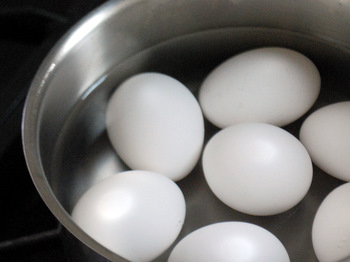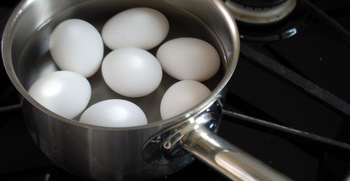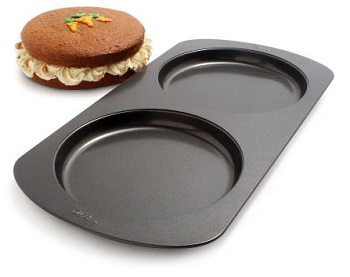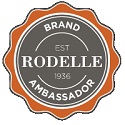
When recipes call for uncooked eggs, many cooks shy away from them. There is good reason for this, of course, since there is a small chance that raw eggs contain salmonella. This is a very small risk to begin with, and few recipes call for uncooked eggs (mayonnaise and some mousses, just to name a few), but you can always pasteurize your eggs to ensure that they are absolutely safe to use even when they are uncooked.
Pasteurized eggs are eggs that are cooked briefly at a high temperature and then cooled. The yolk must reach a temperature of about 138F. Eggs scramble at a much higher temperature, so it is possible to heat the yolk to pasteurize it without cooking the egg. The eggs still have the consistency of raw eggs (and can be used just like them in any recipe) but microbial growth of harmful bacteria is slowed or eliminated. You can buy pasteurized eggs at some markets, but they’re usually difficult to find and expensive. I tend to pasteurize a few eggs at a time before I use them but if you have a feeling you’ll need a lot, you can do it when you first bring eggs home from the market. You can store the pasteurized eggs in the refrigerator (as you would with regular eggs) and not worry about them again.
To pasteurize large eggs, place them in a saucepan filled with water and fitted with a digital thermometer. Turn on the heat and bring the water up to 140F.
Keep the water temperature at 140F for 3 minutes (and no more than 142F), reducing the heat on the burner if necessary. Remove eggs from hot water and rinse thoroughly with cold water.
Store in the refrigerator until needed or use right away.
Jumbo sized eggs need to 5 minutes in 140F water.

Disclaimer: I feel compelled to mention that I cannot absolutely guarantee that this method is going to completely eliminate the 1 in 20,000 chance that an egg you have might have salmonella, although as long as your egg reaches the appropriate temperature, it should be effective.
This is a method that I, and many friends who are chefs/culinary professionals, use to pasteurize our eggs when we need them. The vast majority of bacteria associated with an egg is found on the eggshell. The fresher your eggs are, the better they are. You can buy pasteurized eggs in some grocery stores and you can read more about egg safety here.
Naturally, I would recommend that anyone pregnant, etc. avoid raw eggs just to be on the safe side.






Connie
May 5, 2013In reading further on the USDA website, they say,
“To make a recipe safe that specifies using eggs that aren’t cooked, heat the eggs in a liquid from the recipe over low heat, stirring constantly, until the mixture reaches 160 °F. Then combine it with the other ingredients and complete the recipe.”
Andre
August 28, 2013eggs from the shop are already pasteruized.
Holly
September 30, 2013Well the USDA also says Monsanto gmos are not harmful so I think I could care less what the USDA says. Since payoffs are most likely helping who ever pays.
C
December 30, 2016I’ve never gotten sick from raw commercial eggs, but i did get salmonella poisoning from my own backyard chicken eggs. Wild birds have it and can pass it to chickens very easily. The key, regardless of the origin of the egg, is whether the flock is tested regularly for salmonella. If they aren’t tested regularly, it doesn’t matter how natural or happy the chickens are, you are putting yourself at risk for salmonella poisoning.